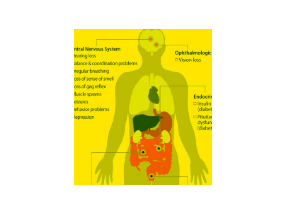Quick Overview
Wolfram Syndrome, a rare genetic disorder, often referred to as DIDMOAD (Diabetes Insipidus, Diabetes Mellitus, Optic Atrophy, and Deafness), is a rare genetic disorder that affects many of the body’s systems.
It is characterized by childhood-onset diabetes mellitus, optic atrophy, diabetes insipidus, and hearing loss. Other symptoms may include neurological problems, bladder and bowel dysfunction, temperature regulation problems, and endocrine, psychiatric, and neurological abnormalities.

Table of Contents
Wolfram Syndrome Causes
It is caused by mutations in the WFS1 gene (in most cases) or the WFS2 gene. These genes are involved in the production and function of proteins that are essential for the proper functioning of cells. Mutations in these genes can lead to damage to cells in the pancreas, brain, eyes, ears, and other parts of the body.
Read Langerhans Cell Histiocytosis: A Rare Disorder of the Immune System
Signs and Symptoms
It is characterized by a wide range of symptoms that affect various systems of the body. Common signs and symptoms include;
- Diabetes Mellitus: Early-onset diabetes is often the first sign, typically diagnosed during childhood or adolescence.
- Diabetes Insipidus: This is another form of diabetes that causes excessive thirst and urination.
- Optic Atrophy: Progressive vision loss, often starting with difficulty seeing in dim light and leading to severe impairment.
- Deafness: Sensorineural hearing loss that can vary in severity.
- Neurological Symptoms: This may include ataxia (loss of muscle coordination), psychiatric disorders, and peripheral neuropathy.
- Urinary Tract and Bladder Problems: Issues with incontinence may also occur.
Other symptoms that may occur include;
- Neurological problems (such as seizures, tremors, and ataxia)
- Bladder and bowel dysfunction
- Temperature regulation problems
- Endocrine abnormalities (such as growth hormone deficiency and thyroid problems)
- Psychiatric abnormalities (such as depression, anxiety, and psychosis)
The signs and symptoms can vary from person to person. Some people may develop all of the hallmark signs and symptoms, while others may only develop some of them. The severity of the symptoms can also vary.
Diagnosis
Diagnosing involves a combination of clinical evaluation, genetic testing, and the presence of the characteristic symptoms. Genetic testing can identify mutations in the WFS1 or CISD2 genes. Additionally, physicians may conduct various tests to assess vision, hearing, and blood sugar levels to confirm the presence of the syndrome.
Read about Moyamoya Disease: Cause, Signs, Symptoms, Treatment
Complications
It can lead to a number of complications, including;
- Blindness
- Deafness
- Neurological problems (such as seizures, coma, and death)
- Kidney failure
- Heart disease
- Stroke
- Psychiatric problems
- Early death
Treatment
There is no cure for this disorder, but there are treatments available to manage the symptoms. Treatment may include;
- Insulin injections to manage diabetes mellitus
- Vasopressin injections or desmopressin tablets to manage diabetes insipidus
- Hearing aids or cochlear implants to manage hearing loss
- Medications and other therapies to manage neurological problems, psychiatric problems, and other complications
Life Expectancy
The life expectancy for people with Wolfram syndrome varies depending on the severity of their symptoms. However, most people with this condition die before the age of 40.
Wolfram Syndrome Type 1
It is the most common form of WF syndrome. It is caused by mutations in the WFS1 gene. The hallmark signs and symptoms of WF syndrome type 1 are childhood-onset diabetes mellitus, optic atrophy, diabetes insipidus, and hearing loss.
Wolfram Syndrome Type 2
WF syndrome type 2 is a less common form of Wolfram syndrome. It is caused by mutations in the WFS2 gene. The hallmark signs and symptoms of WF syndrome type 2 are the same as type 1, but people with type 2 may also have stomach or intestinal ulcers and excessive bleeding after an injury.
Questions
Q: Is Wolfram syndrome contagious?
No, Wolfram syndrome is not contagious. It is caused by genetic mutations that are passed down from parents to children.
Q: Is there a cure for Wolfram syndrome?
There is no cure for WF syndrome, but there are treatments available to manage the symptoms. Treatment may include insulin injections, vasopressin injections, hearing aids, and other medications.
Q: What is the life expectancy for people with Wolfram syndrome?
The life expectancy for people with WF syndrome varies depending on the severity of their symptoms. However, most people with Wolfram syndrome die before the age of 40.
Q: How can I prevent Wolfram syndrome?
There is no known way to prevent WF syndrome. It is a genetic disorder that is passed down from parents to children.
Q: What resources are available to people with Wolfram syndrome and their families?
There are a number of resources available to people with WF syndrome and their families. These resources include support groups, educational materials, and financial assistance programs.
Q: What are the symptoms of Wolfram syndrome?
The hallmark symptoms of WF syndrome are childhood-onset diabetes mellitus, optic atrophy, diabetes insipidus, and hearing loss. Other symptoms may include neurological problems, bladder and bowel dysfunction, temperature regulation problems, and endocrine, psychiatric, and neurological abnormalities.
Q: How is Wolfram syndrome diagnosed?
WF syndrome is diagnosed based on the person’s medical history, family history, and physical examination. Genetic testing can be used to confirm the diagnosis.
Q: How is Wolfram syndrome treated?
There is no cure for WF syndrome, but there are treatments available to manage the symptoms. Treatment may include insulin injections, vasopressin injections, hearing aids, and other medications.
Q: What are the complications of Wolfram syndrome?
WF syndrome can lead to a number of complications, including blindness, deafness, neurological problems, kidney failure, heart disease, stroke, psychiatric problems, and early death.
Q: How can I support someone with Wolfram syndrome?
The best way to support someone with WF syndrome is to learn as much as you can about the condition and to be understanding and supportive. You can also help to connect them with resources and support groups.
